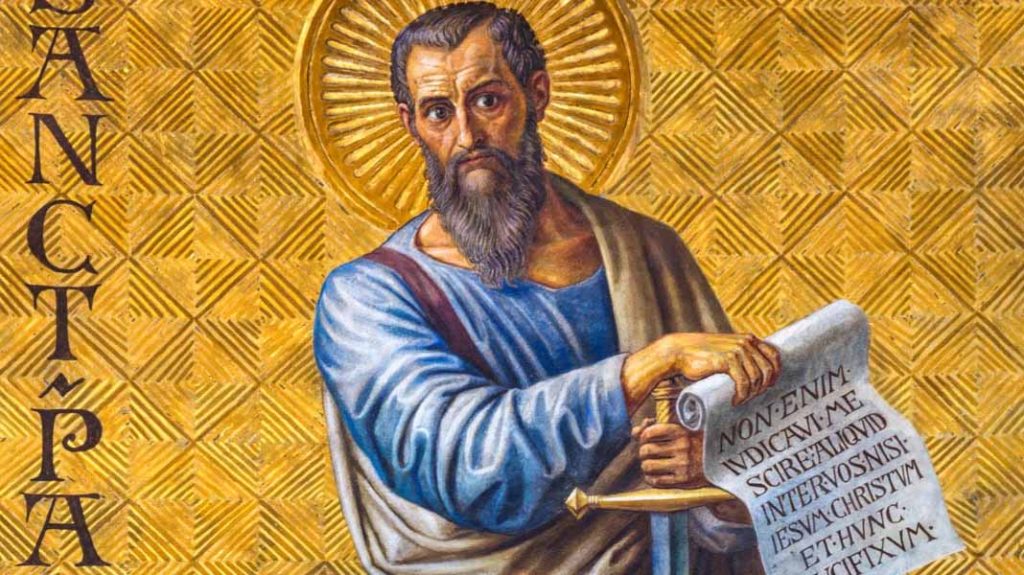We continue, as promised, with a look at the most significant person and contributor presented in the New Testament. You may say, the most important person surely is Christ/Jesus but I would beg to differ. I think the most consequential person in Saul of Tarsus, also known as Paul. I have often found, when debating Christian theology with a committed Christian, they base their arguments on Paul’s ‘supposed’ writings, not those that appear in the four gospels. Who’s character defines the tone Christianity took?
Like Jeshu, Paul was initiated into the Essene order at the age of 12. This was the minimum age requirement for the order. Incidentally, at a later date, Paul, on a journey to Damascus, met a gnostic. As a result of their discussion, Paul asked to join the order. This inspired Paul to work to blend gnostic and kabbalistic views, which he shared with his co-religionists through the medium of a series of letters. After Eusebius was commissioned by Emperor Constantine to compile a doctrine, based on the then-known writings relating to the life of the character ‘Jesus’, he set about collecting as many of Paul’s letters as he could find. These he promptly rewrote to suit his purposes. The only writings that went unmolested were symbolic ones, as Eusebius could not understand their meaning so left them unaltered.
Unfortunately, the satanic invention of the Black Lodge of the concept of ‘sin’, being a crime against an infinite being, who required infinite punishment, was so entrenched in people’s psyche, that Paul decided to run with this theme. His view was that he could liberate society from this misconception by creating another fiction. In this new fantasy, Christ was offered up as a sacrifice to atone for all of Humanity’s sins.
What Paul, who, remember, was a Kabbalist, as well as a Gnostician had done unwittingly, was to conflate the god Christ referred to, who was the head of the Planetary Government, with the tribal, blood-thirsty elemental the Jews had constructed and called Jehovah. Remember what an elemental is? It is a collection of elemental essences, secondary matter, that are aggregated through our individual and collective willpower. When it is a collectively generated elemental, it is also called an egregore. This is what Jehovah was. It was dreamed up by a collective tribal conception of who their god was. This living elemental entity took on a life of its own and the outcomes were not very pretty. I mean, how could God command anyone to kill every man, woman and child in the land of Canaan. Get serious. Paul should have stuck to the message that he would have known Christ/Maitreya would have promulgated. That message was simple, God is love and all of Humanity is equal in this love. Instead, Paul thought his message was better and it just bears out the axiom that “all human wisdom is vanity”.
When you consider how much of the Christian doctrine is interpreted through the lens of Paul’s adulterated writings, it is useful to consider what was presented in the Bible and how it could be interpreted from a Gnostic perspective. The first thing to remember is that everything relating to the Essential/Unity (46) World is referred to as “Christ”. Once you realise this, you understand the many contexts in which Paul uses this word. The term “Christ in you” is referring to 46-atoms in a monad’s envelope. This is, effectively, god immanent.
Theologians could never, quite, get their heads around the concept of “god immanent”. This phrase had three meanings. The first is the consciousness aspect of the 46-atom. So Christ consciousness is Unity consciousness (46). This consciousness is latent in an uninitiated human, i.e. a monad only conscious in the 1st Triad. The second meaning of “Christ” was a reference to the three triads, especially the 2nd Triad. So we go from one world within the triad, to the whole triad itself. “Christ” could also mean a monad’s participation in the Total Cosmic Consciousness.
Now you can understand a saying like, “I live; yet not I, but Christ in me”. Here Christ is referring to Unity/Essential consciousness. The implication was that the monad was saying that they no longer dwelt in their causal envelope, but had moved to their Unity/Essential envelope and become a 46-self. Laurency doubts if Paul ever said this or just used the phrase obliquely, not appreciating its full meaning. The reason is that Paul was not even an initiate. His monad was focused in its mental body, in the 47:4 permanent molecule. That may be a step up from us but nowhere near Unity consciousness.
So, now let’s look at a few gnostic sayings and interpret them.
“I live; yet not I but Christ lives in me”. This is saying that the monad has moved its focus from the 1st to the 2nd Triad.
“In that light, we shall see light”. This refers to the lower worlds appearing darker to a monad focused on a higher world. It is also informing us that when you go up a plane, reality changes. You acquire another dimension and the rules that applied on the inferior plane below, no longer apply on the superior plane. That is why, in the “new” light, you see the “light”. There is yet another meaning and that is by the “light” bestowed by esoteric knowledge, we are led towards the source of this light, the Planetary Hierarchy.
Here is another saying; “The just shall live by faith”. This is telling us that the “just”, those with a knowledge of the Laws of Life, know that there is no injustice in life, only an infallible application of the law.
“Faith without works is dead”. By the term “works’ the Gnostician was referring to living a life in accordance with the Laws of Life. Just saying you have faith is not enough. You have to understand the Laws of Life and apply them faultlessly in your life.
Another famous saying is “take the kingdom of heaven by force”. This is referring to aspirants to discipleship, who have decided to walk up the hill, rather than meander around it. Their single focus is to achieve Unity (46) consciousness and get there as quickly as possible.
In Paul’s writing is the phrase that “we are the children of wrath”. Theologians interpreted this as meaning that we are the “children of the wrath of God”. What this tells us has little to do with God and everything to do with the emotional development of the theologians. Why would you ascribe one of Humanity’s lowest emotions, found on subplane 48:7, most likely, to a characteristic of God?
So, was there an original church? Not really. The Christian teachings wax lyrical about the 12 apostles, except there never were “12 apostles”; nor was there ever a church in Jerusalem. Remember, Jeshu has assembled a motley crew of disciples from a range of esoteric knowledge orders and this group did not preach to anyone. They were fishermen only in the symbolic sense, being the fishers of men.
The first Christian churches that came into being as Christianity spread, were quite different to how Eusebius described them to be in the Acts of the Apostles. These were no deep-thinking folk. They were a collection of illiterates who had more in common with Communist agitators, who dreamed of a dictatorship of the proletariat. Christianity won its followers by preaching a series of nonsense “beatitudes”, such as that the poor and the persecuted were promised Paradise and that they would “inherit” the Earth. They were told by “god” that the “last shall be the first and the first shall be the last”. Good sales pitch; we are still waiting. This illiterate rabble was somehow going to be the greatest in the kingdom to come. Laurency tells us that there was no more “religion” in these early Christian revolutionaries than that found in the agitators of the French and Russian revolutions. It must be remembered that the educated of that day were very small in number and it is they that may have had the opportunity to come into contact with members of an esoteric order.
Laurency is adamant that the Acts of the Apostles are a complete forgery, enunciated by, you guessed it, Eusebius. This guy has a lot to answer for. These facts from esoteric history have been known to all the initiates of higher degrees. Why did they not convey these facts to us in the past? Would you have done, if it meant you either got toasted or were forced to recant after a visit to the Rack? Even when the theosophical circles began to form at the end of the 19th Century and these facts began to be disclosed, they only happened secretly and orally.
So, with that bit of information tucked under our belts, how were Christ/Maitreya’s teachings distorted? Tune in next time to find out.


